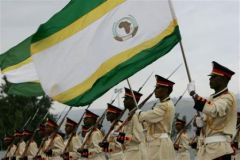Pressure mounts on African leaders to reject Sudan’s chairmanship
Jan 28, 2007 (KHARTOUM) — Sudan braced for a diplomatic showdown as the government confirmed Sunday it intended to secure the chairmanship of the African Union, while outside observers and regional rebels warned the move would compromise the African body’s attempt to pacify Darfur.
 The AU is set to meet this week in Ethiopia to choose its new chairman among African heads of states. The spiraling violence in Sudan’s western Darfur region is expected to top the agenda, along with the ongoing turmoil in Somalia.
The AU is set to meet this week in Ethiopia to choose its new chairman among African heads of states. The spiraling violence in Sudan’s western Darfur region is expected to top the agenda, along with the ongoing turmoil in Somalia.
The AU has 7,000 peacekeepers struggling to end the fighting in Darfur, where many observers say Sudanese President Omar al-Bashir is a party to the conflict and should not chair the organization.
But Khartoum says AU leaders already agreed to select al-Bashir during last year’s summit.
“African heads of states will have to stick to their word (and select al-Bashir), otherwise what is the point for the AU to hold meetings and reach agreements,” Sudanese Foreign Ministry spokesman Ali Sadiq said Sunday.
Sadiq dismissed claims that a Sudanese chairmanship would put the African force in an awkward position in Darfur, saying the regional body’s chief does not have oversight over day-to-day peacekeeping operations.
But Darfur rebel leaders warned they would stop considering the AU mission as an honest peace-broker in Darfur if al-Bashir is selected.
“We are fighting al-Bashir and his army. … There will be huge chaos in Darfur if he becomes AU chairman,” warned rebel chief Khalil Ibrahim in a phone interview from Darfur.
Ibrahim heads the Justice and Equality Movement, which forms the backbone of a rebel coalition that has repeatedly defeated government forces in North Darfur. The coalition recently threatened it would treat AU peacekeepers as a “hostile force” if al-Bashir becomes their nominal head.
“I hope all African leaders understand that we are very serious about this,” Ibrahim said. “If they select al-Bashir, it will mean the AU instantly terminates its mission in Darfur.”
The African Union mission in Sudan said it did not want to comment on the issue until leaders select the body’s new chief.
But several African countries — backed by Western nations — also were pushing for al-Bashir not to become chairman despite the agreement reported last year, diplomats in Khartoum said.
Countries with peacekeeping contingents in Darfur, such as Senegal and South Africa, are among those opposed to al-Bashir’s chairmanship, said the diplomats, who spoke on condition of anonymity because of the sensitivity of the talks.
Sudanese media also reported that neighboring Chad threatened to withdraw from the AU if al-Bashir is selected, and Libya warned it would suspend its financial backing. The reports could not immediately be confirmed.
More than 200,000 people have been killed and 2.5 million displaced in Darfur since rebels took up arms against the central government in 2003. Khartoum is accused of retaliating indiscriminately against civilians and having armed the janjaweed paramilitary groups blamed for the worst atrocities in the conflict.
International aid groups warned again Sunday that they were “reaching breaking point” in Darfur.
“Aid workers are facing violence on a scale not seen before in Darfur, leaving access to people in need at the conflict’s lowest point,” the groups said in a statement.
More than 350 people were killed this month and increasing attacks against civilians have chased tens of thousands from their homes in January alone, said the statement, issued by six aid groups including Care International and the British Oxfam.
“The AU’s credibility with the people of Darfur is at an all-time low,” they said.
Ten peacekeepers have been killed since the AU first deployed in Darfur in June 2004. The AU has repeatedly asked the international community to support it with more funds and equipment.
Khartoum opposes a U.N. Security Council resolution that calls for some 22,000 U.N. peacekeepers to replace the overwhelmed African force.
U.N. Secretary-General Ban Ki-moon said Sunday he was participating in the AU summit because “African issues are my highest priority.”
“I look forward to having a very good discussion with Sudanese President Bashir and African Union Chairman (Alpha Oumar) Konare and other leaders … to resolve the Darfur issue, as well as the situation in Somalia,” he told The Associated Press upon his arrival in the Ethiopian capital, Addis Ababa.
The Sudanese government signed a peace agreement with one Darfur rebel faction in May, but violence has worsened in the region, spilling over into neighboring Chad and Central African Republic.
Sudan and Chad also have been trading accusations of supporting each others’ rebel groups. The Sudan Media Center, deemed close to Khartoum’s government, said Sunday that the hijacking of a Sudanese passenger plane diverted to Chad’s capital last week could have been organized by Darfur rebels with Chadian backing.
Ali Sadiq, the foreign ministry spokesman, denied this, saying Sudan did not blame Chad for the hijacking. He also stressed that Chad’s threat to pullout from the AU was “unimportant.”
Experts say there is mounting pressure on African leaders not to select al-Bashir. “However, I don’t know how they’ll get around it,” said Tom Cargyll, an analyst at Chatham House, a British think tank.
The African Union’s chairmanship is largely symbolic and has little affect on peacekeepers in Darfur, Cargyll said. “But knowing how Sudanese diplomacy works, they would certainly extract the maximum political capital from it,” he said.
(AP)
